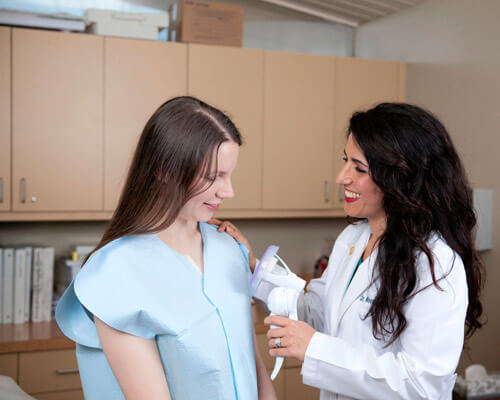(StatePoint) No one wants to think about breast cancer often, but there’s definitely one person with whom you should discuss the topic annually — your doctor. From innovative detection tests to new prevention research, your physician can be a great source of information on new ways women are protecting themselves from this life-threatening illness.
“Between family, friends and career, a doctor’s appointment may not be a top priority for women. But checkups are integral to breast cancer prevention,” says Dr. Steven Quay, chairman, CEO and president of Atossa Genetics and inventor of the ForeCYTE Breast Health Test.
“October, which is Breast Cancer Awareness Month, is an excellent time to take five minutes to schedule your screening exams,” Quay says.
Here are key topics to discuss with your doctor to ensure you make the most of your visit:
Risk
Breast cancer risk is multifaceted. Age is one factor — as you get older your risk rises. Certain lifestyle factors can also increase your risk — being overweight, taking birth control pills, alcohol consumption and not having children.
Genetic risk, heredity, the presence of pre-malignant cells and breast density should also be considered. Talk to your doctor about what tests you should be receiving to determine your risk, and if there are lifestyle changes you should make.
TESTING
Breast cancer can strike at any age. Unfortunately, mammography, the most common test which is now controversial as to its effectiveness, isn’t recommended for younger women. But now there are adjunct tests that younger women can request that can detect silent, reversible milk duct hyperplasia, a condition that can lead to breast cancer in a decade if left untreated. The new quick and non-invasive ForeCYTE Breast Health Test, for example, collects and analyzes individual cells from a small sample of milk duct fluid collected from each breast, and can provide vital early detection of cancer or pre-cancerous conditions.
Just as the Pap smear has reduced cervical cancer rates by over 70 percent by finding and treating reversible pre-cancer before it becomes cancer, the goal of Atossa Genetics, maker of ForeCYTE and other diagnostic risk assessments, is to reduce the high rate of breast cancer through early detection of reversible precursor changes that can lead to breast cancer and to treat those early changes.
“From lifestyle changes to therapeutic interventions, knowing your lifetime risk of breast cancer can help you make important medical decisions now,” notes Quay.
More information about determining your risk for breast cancer can be found at www.AtossaGenetics.com.
LIFESTYLE
Maintaining a healthy body weight can reduce your risk for breast cancer. Ask your physician or a registered dietician for advice on improving your diet. Your doctor can also recommend the best way to ease into a fitness routine, taking into account your overall health and current fitness level.
If you’re a smoker or drinker, ask your physician to direct you toward resources that can help you curb the habit.
This Breast Cancer Awareness Month, take charge of your health by learning more about early detection, testing options and prevention.


























